Research can be time-consuming and overwhelming, but Artificial Intelligence (AI) is changing the game. There are several AI tools being introduced in every other field and so in the filed of research. These smart AI tools are making research easier and faster in many ways.
These tools can quickly search through tons of information, pick out the important parts of complicated papers, and even help write and organize sources. By taking care of these time-consuming tasks, AI tools free up researchers to think more deeply about their work and develop new ideas.
Using AI tools has been quite controversial since its boom. However, everyone needs to realize that these tools could help you in so many ways if used correctly.
Whether you’re writing a school paper, working on a big academic project, or doing research for your job or PhD, using the right AI tools can speed up your process and help you discover more.
In this article, we’ll look at some of the best AI research tools that can make your work easier and potentially more impactful.
Table of Contents
What are AI research tools?
AI research tools are digital assistants that use AI to help with various aspects of the research process. These smart tools are designed to make your research work easier and more efficient as they can do many things, from finding relevant articles and summarizing complex information to improving your writing and managing your citations.
Some AI research tools are good at specific tasks, like checking grammar or detecting plagiarism, while others offer a wide range of features to support different parts of your research. They work by using advanced computer programs and large language models that can understand and process large amounts of information quickly. By using these tools, researchers can save time on repetitive tasks and focus more on analyzing information and developing new ideas.
Top AI research tools:
Here are the top 6 AI research tools we worked on for you:
Scite
Scite is an AI-powered tool designed to assist researchers to evaluate and use scientific literature. It works by analyzing citations in academic papers, providing valuable context about how other researchers have used or interpreted a particular piece of work.
When you add a scientific paper to Scite, it scans through its database of academic literature to find all the places where that paper has been cited. But the interesting thing is that it doesn’t just count citations, it uses advanced natural language processing to understand the context of each citation. It can tell whether other papers are supporting, contradicting, or simply mentioning the original work.
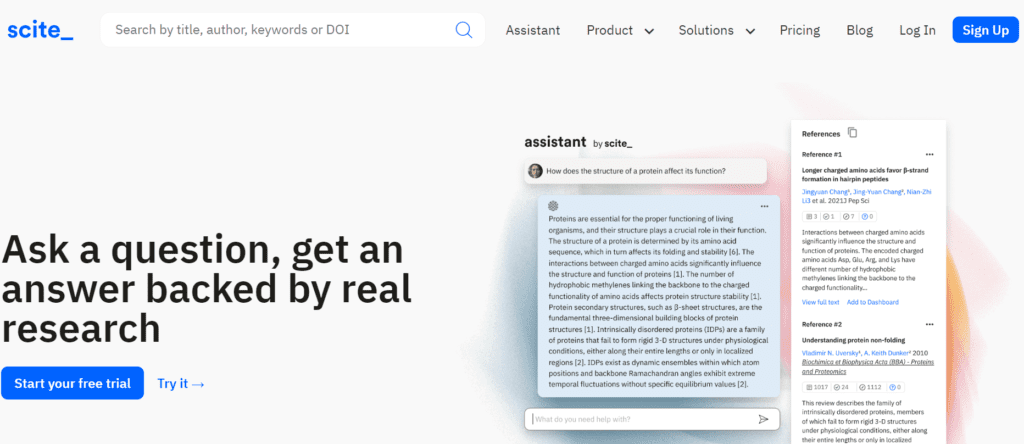
Key features of Scite include:
- Smart Citations: Instead of just showing you how many times a paper has been cited, Scite tells you how it’s been cited. This helps you quickly understand the impact and reception of a piece of research.
- Visual Analytics: Scite presents its findings in easy-to-understand graphs and charts. This helps you to see citation trends.
- Search Functionality: You can search for specific topics or papers and see how they’ve been cited across the scientific literature.
- Integration: Scite can be integrated into reference managers and other research tools, making it easy to incorporate into your existing workflow.
- Alerting System: You can set up alerts to be notified when new citations to a paper of interest are published.
Pricing:
Scite offers an individual plan at £14.13 per month with 7 days free trial with unlimited assistant chats and history. It also offers a Team plan with custom pricing.
ResearchRabbit
ResearchRabbit uses AI to create a personalized feed of research papers meeting your interests, much like how Spotify recommends music based on your listening habits.
The way ResearchRabbit works is quite intuitive. You start by adding a few papers that are central to your research interests. The AI then analyzes these papers, looking at their content, authors, citations, and other metadata. Based on this analysis, it creates a network of related papers and starts recommending new ones that you might find interesting or relevant.
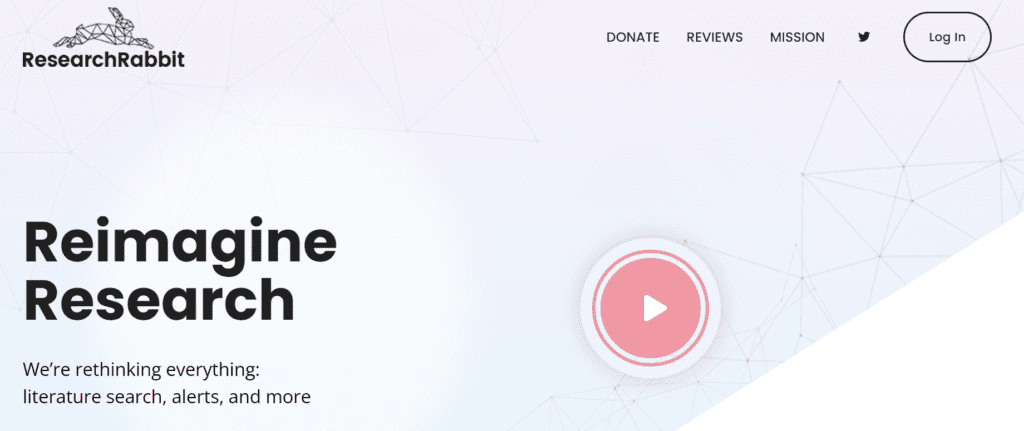
Key features of ResearchRabbit include:
- Personalized Recommendations: The more you use ResearchRabbit, the better it gets at understanding your research interests and recommending relevant papers just like social media platforms.
- Visual Network Maps: ResearchRabbit creates interactive visual maps showing how different papers, authors, and research areas are connected. This can help you discover new connections and research directions.
- Collaboration Tools: You can create and share collections of papers with colleagues, making it easier to collaborate on literature reviews or research projects.
- Time-based Exploration: The tool allows you to explore how research in your field has evolved over time, helping you understand the historical context of current research trends.
- Integration with Reference Managers: ResearchRabbit can integrate with popular reference management tools, making it easy to save and organize the papers you find.
Pricing:
The best thing about Research Rabbit is that this AI tool is completely free to use.
Scholarcy
Scholarcy is an AI-powered tool designed to help researchers, students, professionals or anyone quickly extract key information from long and complex documents. It is particularly useful for dealing with lengthy academic papers, reports, and book chapters, which can often be time-consuming to read and understand.
When you upload a document to Scholarcy, it reads through the entire text, identifying the most important points, key facts, figures, and conclusions. It then presents this information in a clear, easy-to-read summary. Beyond simple summarization, scholarcy also extracts and organizes metadata, and references, and even creates flashcards from the content.
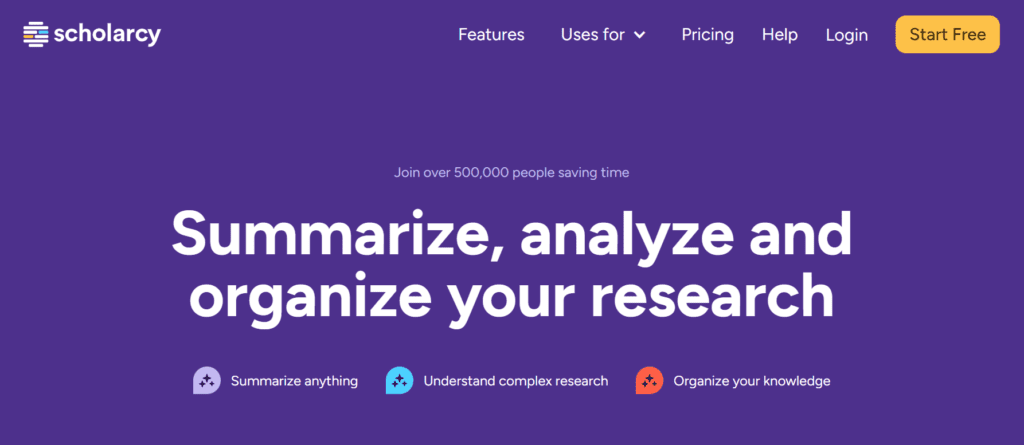
Key features of Scholarcy include:
- Smart Summaries: Scholarcy creates concise summaries of long documents, highlighting the most important information.
- Reference Extraction: The tool automatically extracts and organizes references from the document, helping you in saving your time of manually compiling a bibliography.
- Flashcard Creation: Scholarcy generates flashcards from the key points in the document, which can be great for revision or quick reference.
- Metadata Extraction: It pulls out important metadata like authors, publication dates, and keywords, making it easier to organize and cite your sources.
- PDF and Word Document Support: Scholarcy can handle various document formats, including PDFs and Word files.
Pricing:
Scholarcy provides a free article summarizer with a limit of 3 summaries per day. Its paid subscription i.e., Scholarcy Plus costs £7.99 per month with unlimited summarization, one-click bibliographies, and several other features.
Consensus
Consensus– AI-powered search engine, is specifically designed for scientific literature. Unlike general search engines, Consensus focuses on providing accurate, up-to-date information from peer-reviewed academic sources.
When you enter a query into Consensus, it doesn’t just return a list of relevant papers. Instead, it scans through millions of scientific articles, extracts the key findings, and presents a summarized answer to your question.
It also provides information about the level of scientific consensus on the topic, helping you understand how widely accepted certain findings are in the scientific community.
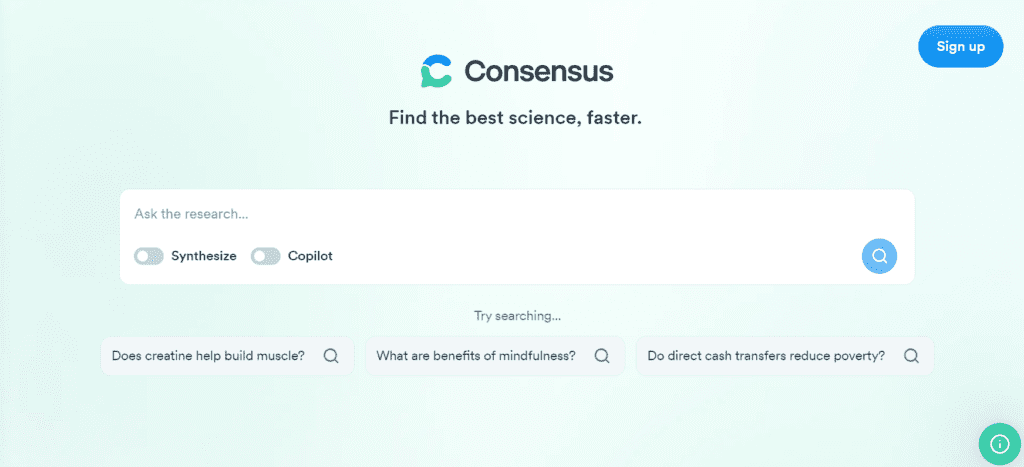
Key features of Consensus include:
- AI-Powered Search: Consensus uses advanced AI to understand your query and find relevant scientific information, even if you don’t use exact scientific terminology.
- Summarized Answers: Instead of just giving you a list of papers to read, Consensus provides a concise summary of the current scientific understanding of your topic.
- Consensus Meter: This unique feature shows you how much agreement there is in the scientific community about a particular finding or claim. Although this consensus is not always accurate, users need to verify the information on their own.
- Source Transparency: Consensus always provides links to the original peer-reviewed sources, allowing you to dig deeper if you want more information.
- Up-to-date Information: The tool is constantly updating its database with new research, ensuring you’re getting the most current scientific information.
Pricing:
Consensus offers a free plan with unlimited searches, unlimited research quality indicators, and unlimited AI-powered filters It also offers 20 AI credits per month for more powerful features including GPT-4 Summaries, Consensus Meters, and much more.
Consensus offers a few other plans including the Premium plan with almost £7 per month, and the Team plan with approximately £8 per person per month with several advanced features. It also offers an Enterprise plan with custom pricing details.
Jenni
Jenni is an AI-powered writing assistant specifically designed for academic and research writing. This AI tool offers suggestions, helping you refine your ideas. Jenni is particularly useful for students, researchers, and academics who want to improve the quality and efficiency of their writing process.
When you start writing with Jenni, it analyzes your text in real time, offering suggestions for improvements in grammar, style, and structure. But Jenni goes beyond simple proofreading, it can help with the entire writing process, from brainstorming ideas to formatting citations.
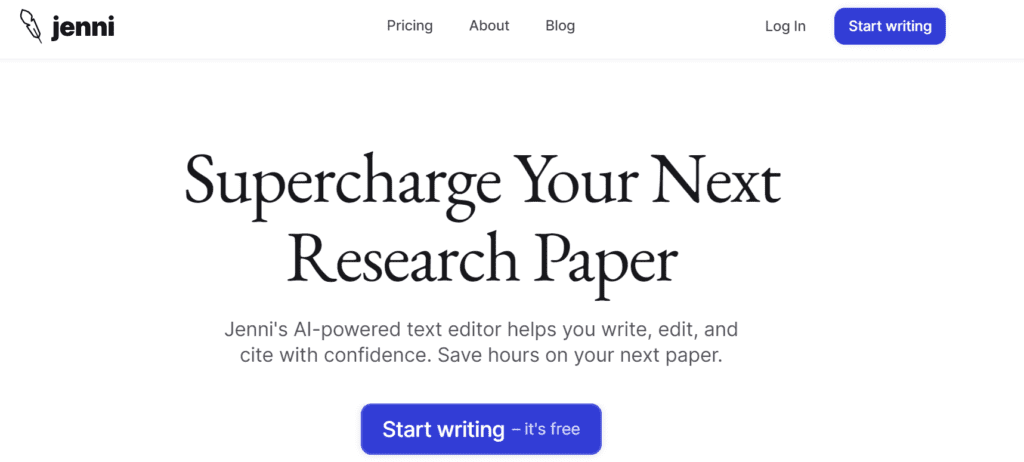
Key features of Jenni include:
- AI-Powered Suggestions: Jenni uses advanced AI to understand the context of your writing and offer relevant suggestions.
- Grammar and Style Checking: The tool catches grammar errors and suggests improvements to make your writing clearer and more professional.
- Citation Help: Jenni can assist with formatting citations in various academic styles, helping you avoid common citation errors.
- Idea Generation: If you’re stuck, Jenni can suggest research questions, potential arguments, or areas for further exploration based on your topic.
- Plagiarism Checking: The tool can scan your work against a large database to help you avoid unintentional plagiarism.
- Vocabulary Enhancement: Jenni can suggest more academic or field-specific vocabulary to elevate your writing. Not only academic, but it also offers several writing tones that you can adjust according to your needs.
Pricing:
Jenni offers a free plan with a limit of 200 words per day. To access unlimited AI words and other advanced features, Jenni charges approximately £23 per month.
Quillbot
Quillbot is a versatile AI-powered writing tool that’s useful for paraphrasing, summarizing, and improving the overall quality of your writing. While it’s not exclusively for academic writing, many researchers and students find it invaluable for refining their work and ensuring clarity in their writing.
When you add text to Quillbot, its AI analyzes the content and offers various ways to rephrase or summarize it. You can choose from different modes depending on how much you want to change the original text.
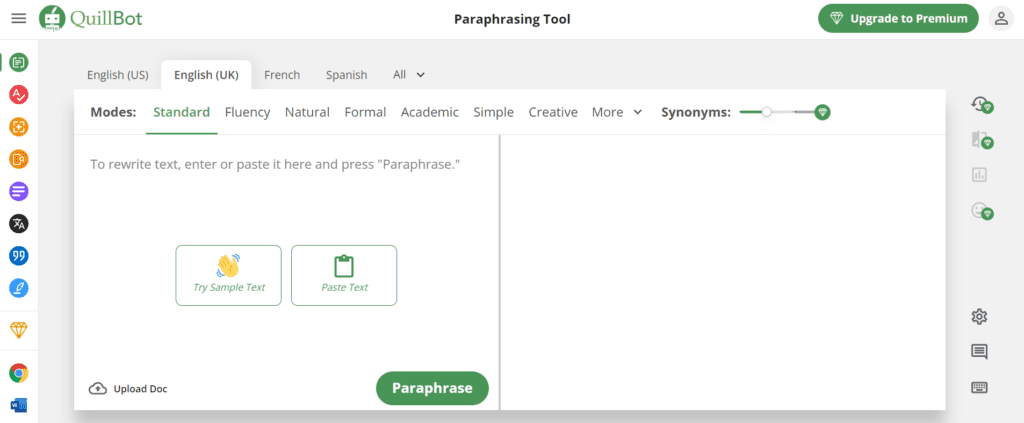
Key features of Quillbot include:
- Paraphrasing Tool: It can rephrase your text in multiple ways, helping you avoid repetition and improve clarity.
- Summarizer: Quillbot can condense long pieces of text into shorter summaries while retaining the key points.
- Grammar Checker: The tool includes a robust grammar-checking feature to help you catch and correct errors in your writing.
- Citation Generator: Quillbot can help you create properly formatted citations in various academic styles.
- Vocabulary Enhancement: The tool can suggest synonyms and more sophisticated vocabulary to elevate your writing.
- Tone Adjustment: You can adjust the tone of your writing from formal to casual, depending on your needs.
- Plagiarism Checker: Quillbot includes a plagiarism-checking feature to help ensure the originality of your work.
Pricing:
Quillbot also offers a free plan with 125 words in paraphrase, standard and fluency modes, 1,200 words in Summarizer, and other limited features. Their premium plan costs about £18 per month with several features including unlimited words in paraphrase, full use of synonym slider, 6000 words in summarizer, plagiarism checker with 25,000 words per month, and much more.
Final Thoughts
In this highly advancing AI era, anyone can speed up their work efficiently by using these advanced and efficient AI tools. If you are the one doing research, you can easily excel in your research by doing it in no time with the help of the above-mentioned AI tools. Give them a try and let us know, which one is your favorite.

